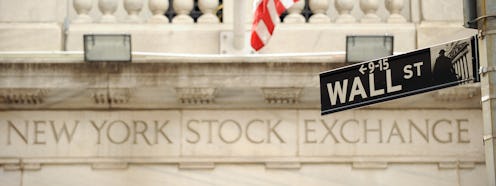News
Bernie Sanders Voted For Wall Street In 2000
A self-proclaimed Democratic socialist without a super PAC, Vermont senator Bernie Sanders has pretty much hinged his entire campaign on taking down Wall Street. He calls the economy "rigged," and he often raises money in notably small increments. It's fascinating, then, that Sanders actually voted in favor of Wall Street at least once during his time in Congress — and Hillary Clinton called him out on that vote in a big way during Thursday's Democratic debate in New Hampshire.
Thursday's last-minute debate ahead of Monday's New Hampshire primary focused heavily on the economy. That sounds like it should have been a good thing for Sanders, who has made a name for himself by bad-mouthing Wall Street and Clinton's connection to it. Things took a turn for the worse for Sanders, though, when Clinton decided to fire back about all the times he has subtly attacked her throughout the campaign, particularly on the economy, saying:
You’re the one who voted to deregulate swaps and derivatives in 2000, which contributed to the over-leveraging of Lehman Brothers, which was one of the culprits that brought down the economy.
She even made sure to get the "swaps and derivatives" sound byte in one more time:
I’m not impugning your motive because you voted to deregulate swaps and derivatives — people make mistakes —and I’m certainly not saying you did it for any kind of financial advantage, but what we’ve got to do as Democrats is be united to actually solve these problems.
As it turns out, Clinton's claim is unavoidably true. As a member of the House of Representatives in 2000, Sanders voted for the Commodity Futures Modernization Act. The act prevented the government from regulating credit default swaps and the trading of financial derivatives. In a credit default swap, the buyer of the swap will either gain protection or earn a profit when the seller of the swap has a negative credit event (i.e., doesn't pay on time), according to Investopedia. If it sounds sketchy, then you've got good intuition. Swaps like these, which are a type of financial derivative, were largely vilified during the financial meltdown of 2008.
So why would Sanders vote for something that made Wall Street trillions but encouraged irresponsible behavior among big banks? He hasn't explained or justified his vote; however, he has criticized the bill and he has said that he regrets voting for it. He has even worked to close some of the loopholes that it created.
Whether he intended to support Wall Street in 2000 or not, Sanders was far from the only Democrat who voted for the bill. It passed the House by a wide margin: Only four representatives did not vote for it. Not to mention, Clinton's husband, then-president Bill Clinton, supported the bill and signed it into law.
